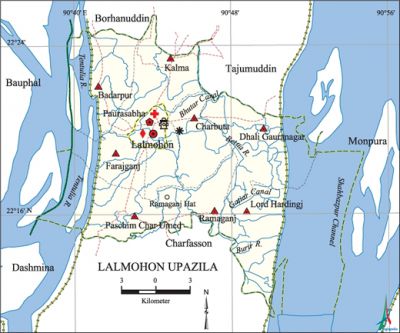Lalmohan Upazila
Lalmohan Upazila (bhola district) area 396.24 sq km, located in between 22°10' and 22°26' north latitudes and in between 90°38' and 90°55' east longitudes. It is bounded by burhanuddin and tazumuddin upazilas on the north, char fasson upazila on the south, manpura upazila on the east, dashmina and bauphal upazilas on the west.
Population Total 283889; male 138877, female 145012 (Census 2011); Muslim 261964, Hindu 14558, Buddhist 11 and others 14 (Census 2001).
Water bodies Main rivers: tentulia, Betua, Boalia; Debnath Beel, Gatiar and Bhutar Canals, Shahbazpur Channel are notable.
Administration Lalmohan Thana was formed in 1919 and it was turned into an upazila in 1983.
| Upazila | ||||||||
| Municipality | Union | Mouza | Village | Population | Density (per sq km) | Literacy rate (%) | ||
| Urban | Rural | Urban | Rural | |||||
| 1 | 9 | 53 | 78 | 36066 | 247823 | 716 | 45.8 (2001) | 38.0 |
| Municipality | ||||||||
|
Area (sq km) |
Ward |
Mahalla |
Population |
Density (per sq km) |
Literacy rate (%) | |||
| 6.55 (2001) | 9 | 18 | 20522 | 2738 (2001) | 60.3 | |||
| Upazila Town | ||||||||
|
Area |
Mouza |
Population |
Density |
Literacy rate | ||||
| 15.12 (2001) | 4 | 15544 | 991 (2001) | 44.1 | ||||
| Union | ||||
| Name of union and GO code | Area (acre) | Population | Literacy rate (%) | |
| Male | Female | |||
| Kalma 47 | 8398 | 17616 | 18682 | 37.7 |
| Char Bhuta 19 | 6712 | 13743 | 14792 | 38.5 |
| Dhali Gaurnagar 28 | 11795 | 20064 | 20855 | 40.8 |
| Paschim Char Umed 70 | 7906 | 17675 | 17870 | 34.2 |
| Farazganj 38 | 5698 | 11374 | 12351 | 33.7 |
| Badarpur 16 | 9724 | 16961 | 18113 | 35.7 |
| Lord Hardinje 66 | 11363 | 12987 | 12811 | 42.8 |
| Lalmohan 57 | 3736 | 7517 | 8027 | 44.1 |
| Ramganj 76 | 5844 | 10552 | 11377 | 41.4 |
Source Bangladesh Population Census 2001 and 2011, Bangladesh Bureau of Statistics.

Archaeological heritage and relics Temple at the residence of Bijay Babu, Khas Mahal Land Office.
War of Liberation Freedom fighters of the upazila did not have any encounter with the Pak army but they joined hand with freedom fighters of Barisal and were involved in the fight against Pakistani soldiers at Taltali. The local freedom fighters also attacked the Lalmohan Police Station and drove way the razakars and hostile police forces from there.
For details: see লালমোহন উপজেলা, বাংলাদেশ মুক্তিযুদ্ধ জ্ঞানকোষ (Encyclopedia of Bangladesh War of Liberation), বাংলাদেশ এশিয়াটিক সোসাইটি, ঢাকা ২০২০, খণ্ড ৯।
Religious institutions Mosque 538, temple 13. Noted religious institutions: Darra Mosque, Uttar Bazar Baro Mosque, Mia Bari Mosque and Madan Mohan Akhra, temple of Gajaria, temple of Babu Bari.
Literacy rate and educational institutions Average literacy 40.0%; male 41.3%, female 38.8%. Educational institutions: college 4, secondary school 35, primary school 180, NGO school 31, madrasa 176. Noted educational institutions: Lalmohan Government Shahbazpur College, Dr. Azhar Uddin College, Lord Hardinje Secondary School, Ramaganj Secondary School, Lalmohan Islamia Kamil Madrasa.
Newspapers and periodicals Irregular: Shrabani, Dip Shikha, Somoer Shikha.'
Cultural organisations Library 3, club 34, cinema hall 4, literary sangsad 2, playground 18.
Main sources of income Agriculture 63.91%, non-agricultural labourer 5.86%, commerce 12.28%, transport and communication 2.02%, service 5.02%, construction 0.86%, religious service 0.29%, rent and remittance 0.36% and others 9.40%.
Ownership of agricultural land Landowner 54.86%, landless 45.14%; agricultural landowner: urban 43.01% and rural 56.47%.'
Main crops Paddy, chilli, wheat, sweet potato, ground-nut, betel nut, betel leaf, masur, gram.
Extinct or nearly extinct crops Tobacco, jute, linseed, sugarcane.
Main fruits Mango, jackfruit, papaya, banana.
Fisheries, dairies and poultries Fishery 45, poultry 32.
Communication facilities Pucca road 154.44 km, semi-pucca road 43.18 km, mud road 695 km; waterway 58 km.
Extinct or nearly extinct traditional transport Palanquin, bullock cart.
Noted manufactories Ice factory.
Cottage industries Blacksmith, potteries, embroidery, bamboo work, cane work, wood work.
Hats, bazars and fairs Hats and bazars are 42, most noted of which are Ramaganj, Hariganj, Nazirpur, Kartar hats, Lord Hardinje Bazar, Debir CharBazar, Mangle Sikdar Bazar and Raichand Bazar.
Main exports Hilsha fish.
Access to electricity All the wards and unions of the upazila are under rural electrification net-work. However 16.9% of the dwelling households have access to electricity.
Sources of drinking water Tube-well 97.8%, tap 0.4% and others 1.8%.
Sanitation 71.0% of dwelling households of the upazila use sanitary latrines and 25.2% of dwelling households use non-sanitary latrines; 3.8% of households do not have latrine facilities.
Health centres Upazila health complex 1, union health complex 5, mother and child welfare centre 1,' community clinic 19.
NGO activities Operationally important NGOs are brac, asa. [Shakhowat Hussain]
References Bangladesh Population Census 2001 and 2011, Bangladesh Bureau of Statistics; Cultural survey report of Lalmohan Upazila 2007.
